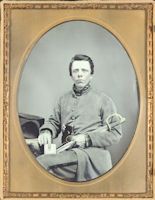JUNE 29TH.—The 4th of July is fast approaching, and if we do not get our prize by that time, we will have a little celebration out here in the woods, for we have flags, drums and plenty of spread-eagle speakers, and we can omit the cannon, of which kind of music we have had a surfeit. Yes, we have all the material for a patriotic celebration, but I had hoped we should waive the old flag in Vicksburg that day.
I was sick last night, and up many times before day; and as I walked among the sleepers, I was astonished at the snoring; the variety of sounds made was as great as that of a brass band.
A rumor circulates that Pemberton has made an attack on our lines at Vicksburg, trying to cut his way out, but failed of his purpose. From a prisoner brought in, I have learned, by questioning, that the rebel authorities have made numerous drafts for young and old, to refill their ranks, and I think their army now must be as strong as it can ever be. By conscription and terrorism they have forced into the field every available man. With the North it is not so, for the old song, “We are Coming, Father Abraham, Three Hundred Thousand More,” is being sung there yet, with good will, and volunteers are still pouring in to fill up what may be lacking in our ranks. We can thus throw renewed forces against failing ones.
Monday, 29th—I was detailed to go to the shop; came on to town, found Stroud and came out five miles to shop. Still raining. We spend the night at the shop.
June 29 — Sharp shooting today as usual. Mathisas of Co. F. died in the trenches this morning of cramp. He did not live more than ten minutes after he was taken. King Stalcup of the 31st Tenn. Regt. was killed last night by some of our own men. The Yankees made a charge on our right this evening but were repulsed. W.R.C.
June 29th. The command marched at 6 A. M. and made the longest and most severe march in its history. We passed through Liberty and Jonhsville to Uniontown, a distance of fully thirty miles. Some say thirty-five. The roads were good but fearfully dusty. We rested occasionally, perhaps three hours all told, and went into bivouac in fair condition, although there were many stragglers. The day was beautiful, but the sun much too hot for comfort. Riding at the head of the column the general suggested that every man be required to contribute something for the amusement of the party. I unexpectedly made quite a hit by relating a lot of Ovid’s metamorphoses, which some of them had never heard of before and thought very wonderful. Occasionally we dismounted and walked, and at times rode out of the column to neighboring houses to have a chat with the natives, get a cool drink of water, and perhaps a chat with the girls of the establishment. How one does enjoy a stretch on the cool green grass after the day’s march is over, and what an immense appetite one has at night. Nothing can be more delightful and interesting than campaigning in a civilized country at this season of the year. Uniontown is a pretty secluded village, patriotic, but paralyzed just now by the nearness of the rebel army.
In passing through these towns, we usually resume the regular step, and with bands playing and colors flying make a stunning appearance. The Fifty-second, as in days gone by, although now with fewer voices, sing their memorable songs, which creates more enthusiasm than do the bands.
by John Beauchamp Jones
JUNE 29TH.—There is no confirmation of the report of the fall of Vicksburg, but it may be so; nor is it certain that we have advanced to Harrisburg, but it is probable.
Gen. D. H. Hill writes (on Saturday) from Petersburg that 40,000 of the enemy could not take Richmond; but this may be fishing for the command. He says if Gen. Dix comes this way, he would make him a subject of the cartel of exchange which he (Dix) had a hand in negotiating.
J. M. Botts writes, from his farm in Culpepper, that our men are quartered on his premises, and do as much injury as a hostile army could. He is neutral. They pay him ten cents per day for the grazing of each horse.
The Commissary-General is again recommending the procuring of bacon from within the enemy’s lines, in exchange for cotton. Why not get meat from the enemy’s country for nothing?
Hon. R. M. T. Hunter writes to the Secretary of War to let the Quartermaster-General alone, that he is popular with Congress, and that his friends are active. It might be dangerous to remove him; the President had better commission him a brigadier-general. He says Judge Campbell wants the President to go to Mississippi; this, Mr. H. is opposed to. Mr. H. is willing to trust Johnston, has not lost confidence in him, etc. And he tells the Secretary to inform the President how much he (H.) esteems him (the President).
The New York Times publishes an account of one of their raids on the Peninsula, below this city, as follows: [click to continue…]






